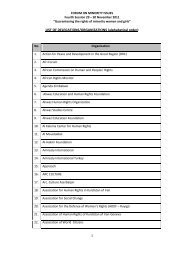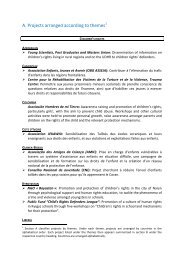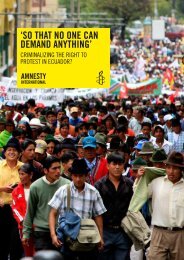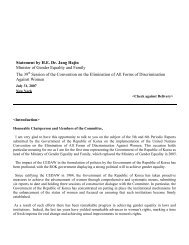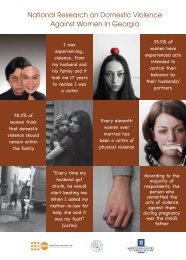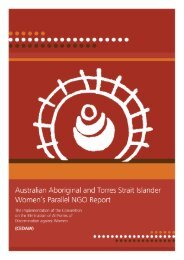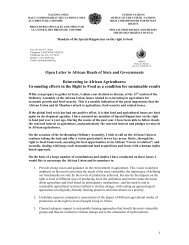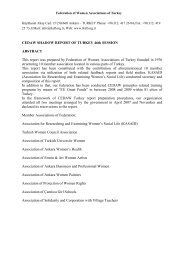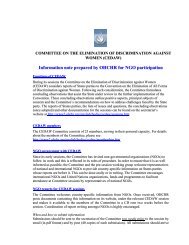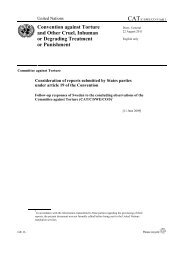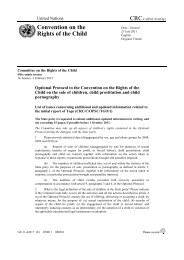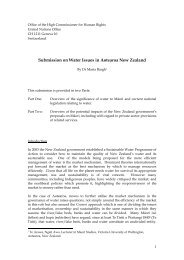Report - Office of the High Commissioner on Human Rights
Report - Office of the High Commissioner on Human Rights
Report - Office of the High Commissioner on Human Rights
- No tags were found...
Create successful ePaper yourself
Turn your PDF publications into a flip-book with our unique Google optimized e-Paper software.
diseases (STDs), HIV/AIDS etc; <str<strong>on</strong>g>the</str<strong>on</strong>g>re is also limited<br />
knowledge about preventi<strong>on</strong> and treatment.<br />
Participati<strong>on</strong> and selfexpressi<strong>on</strong><br />
Resettlement<br />
Violence against women<br />
• Women are excluded from decisi<strong>on</strong>-making regarding land,<br />
leases, tenure systems etc.;<br />
• Even in matrilineal systems, women are excluded from<br />
decisi<strong>on</strong>-making processes. For example, during<br />
Bougainville’s peace process, negotiati<strong>on</strong>s were c<strong>on</strong>ducted<br />
primarily between ex-combatants and <str<strong>on</strong>g>the</str<strong>on</strong>g> government, with<br />
women predominantly excluded. According to <str<strong>on</strong>g>the</str<strong>on</strong>g> terms <str<strong>on</strong>g>of</str<strong>on</strong>g><br />
<str<strong>on</strong>g>the</str<strong>on</strong>g> new c<strong>on</strong>stituti<strong>on</strong>, <strong>on</strong>ly three seats have been allocated<br />
for women representatives for <str<strong>on</strong>g>the</str<strong>on</strong>g> whole <str<strong>on</strong>g>of</str<strong>on</strong>g> Bougainville.<br />
• There is substantial movement/migrati<strong>on</strong> <str<strong>on</strong>g>of</str<strong>on</strong>g> women from<br />
outer islands to <str<strong>on</strong>g>the</str<strong>on</strong>g> main island, in search <str<strong>on</strong>g>of</str<strong>on</strong>g> employment,<br />
educati<strong>on</strong>, markets and health services;<br />
• This is leading to increasing homelessness and inadequate<br />
housing <strong>on</strong> <str<strong>on</strong>g>the</str<strong>on</strong>g> main island (e.g. <str<strong>on</strong>g>the</str<strong>on</strong>g>re is no accommodati<strong>on</strong><br />
provided for women and <str<strong>on</strong>g>the</str<strong>on</strong>g>ir families coming to town for<br />
medical treatment in <str<strong>on</strong>g>the</str<strong>on</strong>g> hospital; women coming to sell<br />
vegetables have nowhere to sleep. In many cases women<br />
may not be able to afford <str<strong>on</strong>g>the</str<strong>on</strong>g> cost <str<strong>on</strong>g>of</str<strong>on</strong>g> transport to return to<br />
<str<strong>on</strong>g>the</str<strong>on</strong>g> outer island, and so remain <str<strong>on</strong>g>the</str<strong>on</strong>g>re until <str<strong>on</strong>g>the</str<strong>on</strong>g>y have<br />
accumulated sufficient funds).<br />
• Insecure housing means women are vulnerable to rape and<br />
violence.<br />
a. Obstacles faced by rural women<br />
• Papua New Guinea - People have become dependent <strong>on</strong> a development ec<strong>on</strong>omy, which has<br />
led to <str<strong>on</strong>g>the</str<strong>on</strong>g> introducti<strong>on</strong> <str<strong>on</strong>g>of</str<strong>on</strong>g> industries in rural areas (e.g. forestry, mining). Many people believed<br />
this form <str<strong>on</strong>g>of</str<strong>on</strong>g> development would turn rural areas into healthy places to live. Instead, it has made<br />
communities dependent <strong>on</strong> cash ec<strong>on</strong>omies, as such industries are not sustainable in <str<strong>on</strong>g>the</str<strong>on</strong>g> l<strong>on</strong>gterm.<br />
Royalties received by local communities are generally c<strong>on</strong>sumed in <str<strong>on</strong>g>the</str<strong>on</strong>g> short-term, after<br />
which people are forced to move to urban areas for employment. The sense <str<strong>on</strong>g>of</str<strong>on</strong>g> self-reliance and<br />
being able to care for <strong>on</strong>eself is disappearing, with people no l<strong>on</strong>ger relying <strong>on</strong> natural resources,<br />
but believing that m<strong>on</strong>ey is <str<strong>on</strong>g>the</str<strong>on</strong>g> most important factor in life. Lack <str<strong>on</strong>g>of</str<strong>on</strong>g> employment, educati<strong>on</strong> and<br />
health services in rural areas is causing people to move to urban areas.<br />
“The Papua New Guinea c<strong>on</strong>stituti<strong>on</strong> talks about integral human development, which<br />
requires <str<strong>on</strong>g>the</str<strong>on</strong>g> government to provide social services in <str<strong>on</strong>g>the</str<strong>on</strong>g> community. If women are not<br />
provided with adequate social services in rural areas <str<strong>on</strong>g>the</str<strong>on</strong>g>n that means <str<strong>on</strong>g>the</str<strong>on</strong>g> c<strong>on</strong>stituti<strong>on</strong><br />
does not mean what it talks about; if women in rural areas are not educated or do not<br />
have spaces in schools, <str<strong>on</strong>g>the</str<strong>on</strong>g> c<strong>on</strong>stituti<strong>on</strong> does not help. The means <str<strong>on</strong>g>of</str<strong>on</strong>g> implementing <str<strong>on</strong>g>the</str<strong>on</strong>g><br />
c<strong>on</strong>stituti<strong>on</strong> is not working for remote communities in terms <str<strong>on</strong>g>of</str<strong>on</strong>g> services and equal<br />
participati<strong>on</strong> and benefit from resources. There should be proper mechanisms in place<br />
which can be used to make sure that <str<strong>on</strong>g>the</str<strong>on</strong>g> Government is implementing <str<strong>on</strong>g>the</str<strong>on</strong>g> c<strong>on</strong>stituti<strong>on</strong><br />
in ways that benefits every<strong>on</strong>e in <str<strong>on</strong>g>the</str<strong>on</strong>g> country and not just a few people.” (Elizabeth T<strong>on</strong>gne,<br />
Papua New Guinea)<br />
28 WOMEN’S RIGHTS TO ADEQUATE HOUSEING AND LAND



